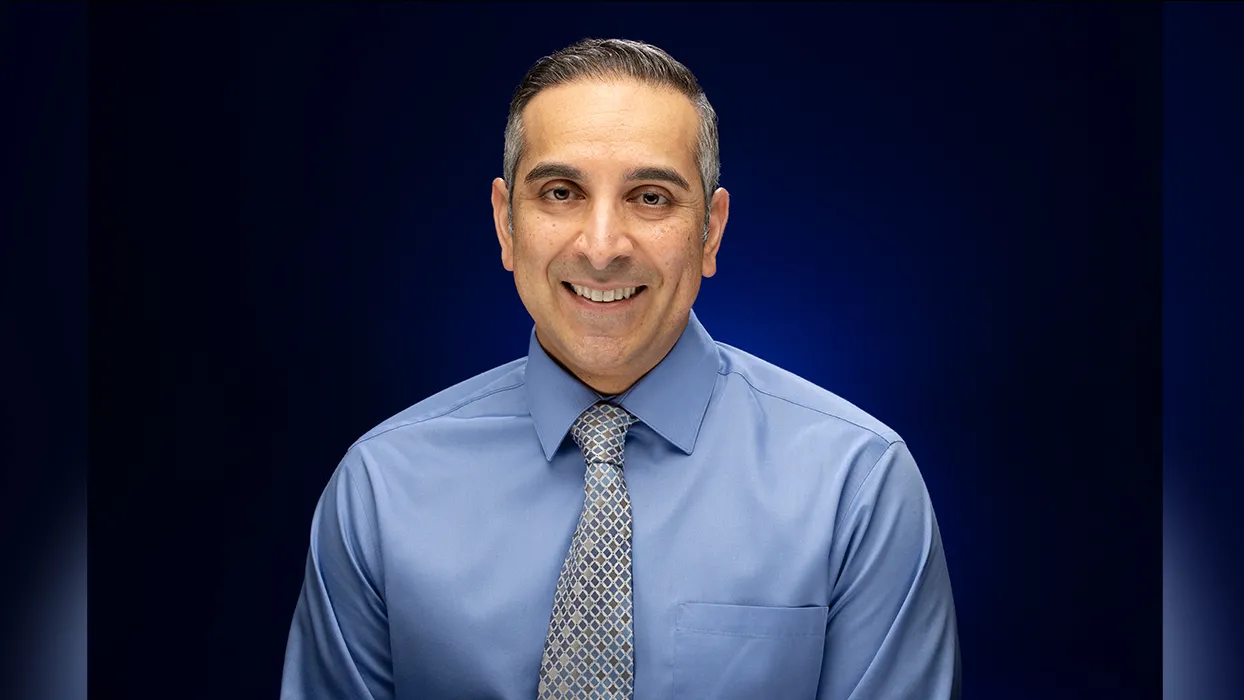Alan Llavore | Office of Strategic Communication | (909) 537-5007 | allavore@csusb.edu

California State University, San Bernardino faculty are leveraging technology to bring information to a wider audience.
Neal G. Malik, associate professor in health science and human ecology and also director of the university’s master in public health program, is a prime example of this. He hosts a daily podcast with an international reach called “Optimal Health Daily.”
The podcast averages 700,000 monthly plays (which translates to approximately 175,000 plays per week), has been downloaded more than 50 million times, is a top 0.5% podcast and has been featured in publications such as the Los Angeles Times, Prevention.com and ShapeScale.com.
Malik (who also goes by “Dr. Neal”) himself has been interviewed by more than 70 different media outlets for his health-related expertise.
He sees his outreach as a reflection of CSUSB’s mission and values. He also views it as a recruitment tool for students interested in the fields of health and nutrition. Through the podcast, they learn that CSUSB is a destination campus for their study.
But this decision to serve as a resource via a podcast – “letting people know they are getting the truth as best as I can give to them via science,” as he puts it – was more unexpected than planned.
It all began with his brother, Justin.
“He had earned his MBA and came out of it saying that he felt he had been trained to follow the money,” Malik said. “But then he began to ask himself, do we really need all this ‘stuff?’ That led him into minimalism. He began reading blogs and thought, hey, other people might want this information, too. So, why don’t I share this information by reading and recording it (with the author’s permission, of course) on a podcast?”
Malik continued, “And then, as he searched for more blogs to read, Justin noticed that a lot of them discussed health. Since this was outside of his scope of knowledge, Justin asked me if I would be interested in reading some blogs on a podcast. It would be 10 minutes a day. And it would get this information out there. Because there is a lot of misinformation.”
In fact, both Maliks bumped up against that health misinformation fairly quickly. So the podcast began to evolve with added commentary where people might be confused. They were very careful not to immediately disagree with the author they were reading, however, but to talk their way through what the issues were with a particular health blog, using Dr. Neal’s degrees in public health and nutrition as their guiding compass.
And that is how it all began for him.
The selection process of which blogs to present on Dr. Neal’s “Optimal Health Daily” podcast remains key. And variety is the secret sauce.
“Folks don’t want to hear the same information over and over again,” he said. “I am looking for well-balanced blogs. Say, intermittent fasting. I will read it so long as they discuss the pros and potential cons. I don’t want to censor anything. But I want an even-handed approach so people can decide for themselves, while ensuring that their decisions are based on the current research. I don’t want to perpetuate misinformation.”
He points out his love of blogs that cite research studies. “Quite a few do,” he said.
Malik has found that people “seem to really want and are really interested in lifestyle hacks or shortcuts. We all want to save time. And money. And they like specifics. For example, preparing meals. Getting all your antioxidants for the day. Making a gym workout more efficient to build more muscle without having to spend long hours doing so.”
He is proud of his journey from 2017 through today in terms of using the podcast medium as an educational tool for the general public. But there is another, more personal, element to his involvement with the field.
“I was diagnosed at 19, while in college, with a chronic disease,” Malik said. “I thought I would go into pre-med. I asked myself, when I leave this earth, what do I want to leave behind? I don’t want anyone to suffer like me.”
He paused, then continued, “This podcast is a way for me to further this mission. And, hopefully, someone might take it to heart and make a difference.”
He sums up what has led him to his career. “This is also why I got into teaching. Becoming a dietitian. Teaching nutrition. Because I wanted to educate students to become disease prevention advocates. I want to spread the word on disease prevention. That is my life’s work.”
Malik brings it all back around to his brother.
“He roped me into this,” he said. “The podcast was his idea.”
It is clear that both brothers, separately and together, are linked by a commitment to learning and educating others in turn.
Malik has worked in higher education since 2007. Prior to his current position, he served as department chair and assistant professor within the department of nutrition and basic sciences at Bastyr University California. His roles have also included serving as the registered dietitian nutritionist and occupational wellness specialist for the University of California, Riverside, and as a lifestyle educator at Kaiser Permanente. He has also held adjunct teaching positions at Crafton Hills College and California State University, Fullerton.
Malik has a bachelor of arts in psychology and social behavior from the University of California, Irvine; a master of public health in health promotion and education from Loma Linda University; and a doctor of public health in preventive care from Loma Linda. He joined CSUSB in September 2019.